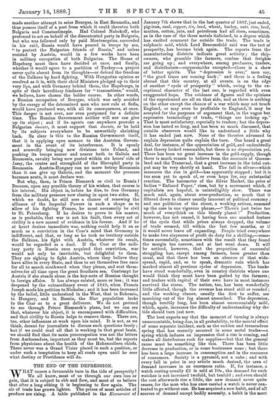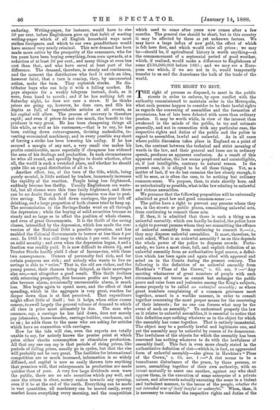THE END OF THE DEPRESSION.
NIVHAT causes a favourable turn in the tide of prosperity? We all know, most of us through our own loss or gain, that it is subject to ebb and flow, and most of us believe that after a long ebbing it is beginning to flow again. The air of trade has grown lighter. The prices of most articles of produce are rising. A table published in the Economist of January 7th shows that in the last quarter of 1887, just ended, pig-iron, coal, copper, tin, lead, wheat, barley, oats, rice, beef, mutton, cotton, jute, and petroleum had all risen, sometimes, as in the case of the three metals italicised, to a degree which has excited comment far outside the trade. The trade in sulphuric acid, which Lord Beaconsfield said was the test of prosperity, has become brisk again. The reports from the manufacturing districts indicate great activity ; the ship- owners, who grumble like farmers, confess that freights are going up ; and everywhere, among producers, traders, and distributors—coppersmiths excepted—there is a show of better spirits. The "depression is over," men say, "the good times are coming back ;" and there is a feeling abroad that this country, at all events, is on the edge of another "cycle of prosperity" which, owing to the ex- ceptional character of the last one, is regarded with even exaggerated hope. The evidence of figures and the opinions of the experienced are all on that side, and as there is nothing on the other except the chance of a war which may not touch England, or may even be profitable to England, it may be accepted for the purposes of argument that, in the vague but expressive terminology of trade, "things are looking up." That is most satisfactory, especially to traders ; but the depres- sion has lasted so long, and has been so much discussed, that outside observers would like to understand a little why it has ended just now. None of the theories advanced to explain depression quite explain the turn. One heard a great deal, for instance, of the appreciation of gold, and undoubtedly that theory looked reasonable, but there is no depreciation yet. There has been no great increase in the gold-supply, though there is much reason to believe from the accounts of Queens- land and the Transvaal, that a great increase in the total out- put may be very shortly at hand. The fall in silver—which measures the rise in gold—has apparently stopped ; but it is too soon yet to speak of, or even hope for, any substantial reaction. The barometer of the Silver Market, the price of Indian " Enfaced Paper," rises, but by a movement which, if capitalists are hopeful, is unintelligibly slow. There was much said, again, about over-production, Bo much that it filtered down to classes usually innocent of political economy ; and one politician of the street, a working artisan, summed up the case in one vigorous phrase,—" There's just twice too much of everythink on this bloody planet !" Production, however, has not ceased, it having been one marked feature of the cycle that while prices always dropped, the volume of trade seemed, till within the last few months, as if it would never leave off expanding. People tried everywhere to make two sixpences of profit do duty for a shilling,—some- times successfully, sometimes with the result that they found the margin too narrow, and at last went down. It will be noticed, however, that the proportion of successful struggling has, except among farmers, been greater than usual, and that there has been an absence of that wide- spread, rapid, and, so to speak, dramatic ruin which has marked almost all previous cycles of depression. The banks have stood wonderfully, even in country districts where one would think they must have been gutted by the farmers ; and traders with capital of their own have in most instances survived the storm. The nation, too, has been wonderfully little affected, though the revenue has stood still or receded ; and the working classes, usually the first to suffer, are marching out of the fog almost unscathed. The depression, though terribly long, has been almost unaccountably mild, which, again, increases the difficulty of understanding why the tide should turn just now.
The best experts say that the moment of turning is always unaccountable, being due, in all probability, to the mental effect of some separate incident, such as the sudden and tremendous spring that has recently occurred in some metal trades—a spring which induces an impression that a rise is coming, and makes all distributors rush for supplies—but that the general cause must be something like this. There has been little decrease in production, or in some businesses none ; but there has been a large increase in consumption and in the resources of consumers. Society is a pyramid, not a cube ; and with every fall in price in any article much desired, the area of demand increases in an enormous ratio. If, for instance, a watch costing usually £2 is sold at 10s., the demand for such watches is not increased twofold, but tenfold ; and even should the cost afterwards rise a little, the new demand never quite ceases, for the man who has once carried a watch is never con- tented to go without one. He has acquired a new habit, and of all sources of demand except bodily necessity, a habit is the most enduring. Writing-paper, for instance, would have to rise 50 per cent. before Englishmen gave up that habit of wasting writing-paper which of all English household ways most strikes foreigners, and which to our own grandfathers would have seemed very nearly criminal. This new demand has been made more active by the prosperity of the consumers, who for ten years have been buying everything, from corn upwards, at a reduction of at least 30 per cent., and many things at even less cost than that, and who have saved at least part of the difference. The demand, therefore, is steady and continuous, and the moment the distributors who feed it catch an idea, however faint, that a turn is coming, they, by unconcerted action, make the turn. They replenish stocks. No dis- tributor buys who can help it with a falling market. He pays sixpence for a weekly telegram instead, deals, as it were, from hand to mouth ; and if he has nothing left on Saturday night, he does not care a straw. If he thinks prices are going up, however, be does care, and fills his depots as full, of imperishable articles at all events, as his capital will allow. The process of recovery is therefore rapid ; and even if prices do not rise much, the benefit to the producer is very great. He has been cheapening things all this while, as well as his customers,—that is to say, he has been cutting down extravagances, devising makeshifts, in- venting economical machinery, and in every possible way short of forcing a strike has been lowering his outlay. If he has secured a margin of any sort, a very small rise males his profits considerable, more especially if cheapness has widened the area of his dealings and production. In such circumstances he wins all round, and speedily begins to doubt whether, after all, the world is such a wretched place, and whether he should -quite like an equal distribution of all in it. Another effect, too, of the turn of the tide, which, being purely mental, is little noticed by traders, immensely increases the rapidity of the reaction. People being less frightened, suddenly become less thrifty. Usually Englishmen are waste- ful, but all classes were this time fairly frightened, and there can be no doubt that part of the depression was due to posi- tive saving. The rich laid down carriages, the poor left off drinking, and a large proportion of both classes tried to heap up. 'The accumulation in the Savings-Banks went on all through the depression ; while the buying of solid securities became so steady and so large as to affect the position of whole classes, and even of great Governments. It is the thrift of the saving classes, intensified by the depression, which has made the con- version of the National Debt a possible operation, and has enabled the Colonial Governments to borrow at less than 4 per cent. In 1861 it was still easy to obtain 5 per cent, for money on solid security ; and even when the depression began, 4 and a fraction was readily paid. It is now difficult to obtain 3i-, and Trustee Stocks hardly yield 3 clear of Income-tax, with these two consequences. Owners of personalty feel rich, and for certain purposes are rich ; and nobody who wants to live on savings is able to "retire." That is, the old are richer, and the young poorer, their chances being delayed, as their marriages also are,—not altogether a good result. This thrift declines with returning prosperity, first because profits are larger, but also because alarm, occasionally unreasonable alarm, is much less. Men begin again to spend more, and the effect of that spending, which in the aggregate is very great, reaches far deeper down than is at first perceived. That expenditure might effect little of itself ; but it helps, when other causes concur, to swell largely the general volume of demand to which all rises in price must ultimately be due. The man who resumes, say, a carriage he has laid down, does not merely pay jobmaster, horse-breeder, carriage-builder, coachman, and so on ; he adds them to the mass who are asking for articles which have no connection with carriages.
How far the tide will rise, even the experts are totally unable to say, for nobody knows the precise point at which price either checks consumption or stimulates production. All that any one can say is that periods of rising prices, like periods of falling prices, usually go in cycles, but that the rise will probably not be very great. The facilities for international competition are so much increased, information is so widely diffused, and capital is now so easily thrown into anything that promises well, that enlargements in production are made quicker than of yore. A very few large dividends soon warn the public, there are no safe securities which pay well, and once the return is clear, money rushes towards any opening, even if it be at the end of the earth. Everything can be made in vast quantities, all machinery can be moved easily, every market hears everything every morning, and the competition which used to come after years now comes after a few months. The general rise should be short, but in this country it may be affected by three as yet unknown factors. We may have a large influx of new gold, the effect of which is felt here first, and which would raise all prices ; we may be—should be, if agricultural history is worth anything—at the commencement of a septennial period of good weather, which, if realised, would make a difference to Englishmen of some £150,000,000 before 1895; and we may see a Euro- pean war which, if we are not in it, would temporarily transfer to us and the Americans the bulk of the trade of the world,







































 Previous page
Previous page